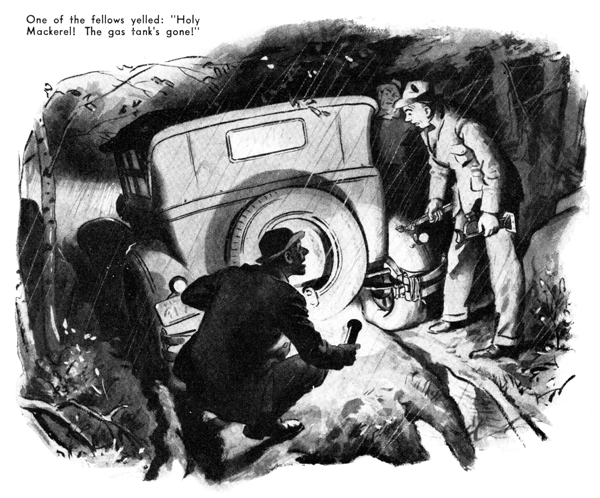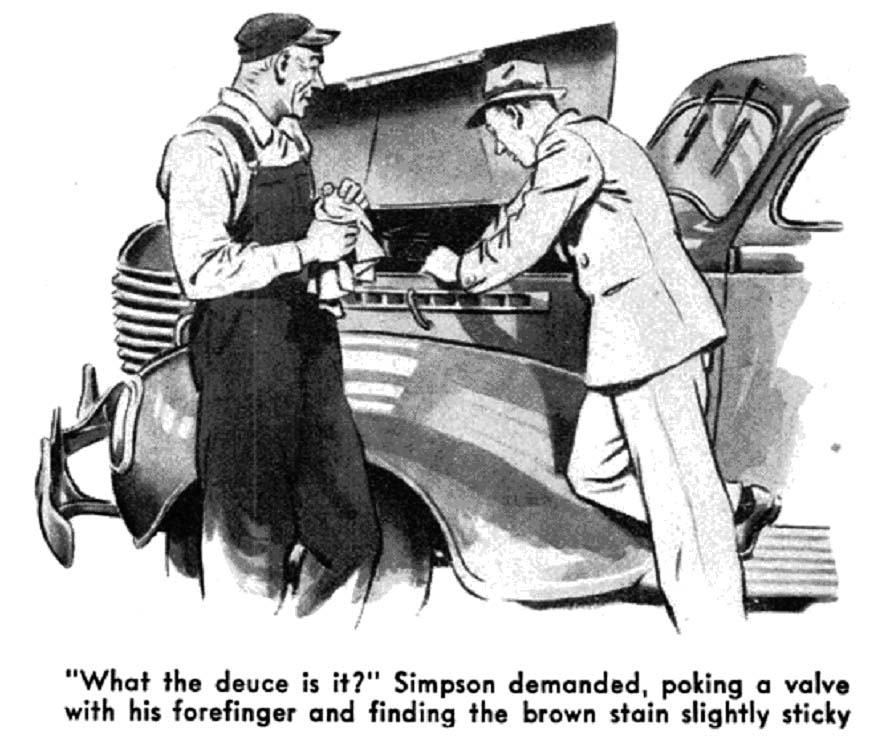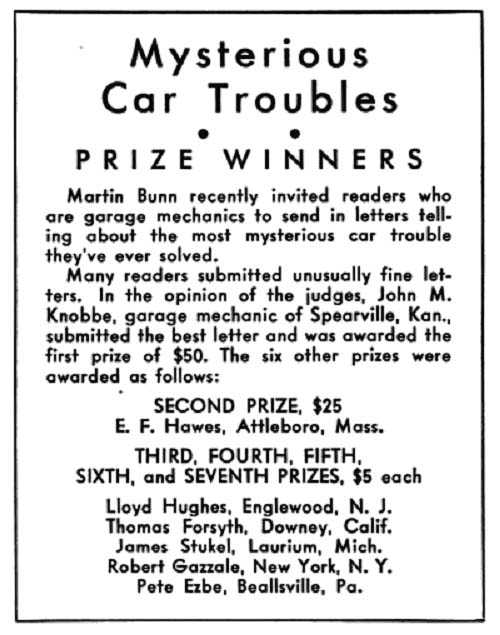May 1939
Gus gives the low-down
on...
VARNISH - A NEW ENGINE TROUBLE
by Martin Bunn

Gus Wilson started it by remarking that the bass season would open the next morning, and that he was going up to the lake to have a try at those odd bronze-backs.
That started off George Knowles, whose number-one conversational favorite is fishing. "I just got back from a fishing trip up in Maine," he told the little group of Gus's customers and friends who had drifted into the shop of the Model Garage for the laudable purpose of killing a late afternoon hour. "Did I tell you about the --"
"Yes, you did!" the group chorused. They had heard plenty about George's fishing adventures since he got back home.
Knowles grinned at them. "All right," he accorded, "I won't make you sunfish catchers jealous by telling you about the twelve pound blue backed salmon that it took me forty minutes to get into the boat . . . This is something different. I've been saving it for Gus -- it's about a queer experience I had with my car.
"One day while I was up there in Maine, a couple of other fellows and I took a trip to a little lake 'way back in the woods. We fished all day, and didn't have any luck at all. Then, just about sunset, they started biting. Oh, boy! Result was that it was after dark when we got ashore, and about nine o'clock by the time we'd finished supper at the guide's house and got started for the hotel in my car. We had a thirty-five-mile drive ahead of us -- fifteen miles of it over as rough a woods road as I've ever seen.
"We hadn't gone far when it started to rain. But we bumped along all right for maybe a half hour. Then we blew out a tire. While we were changing it one of the fellows let out a yell: "Holy Mackerel! The gas tank's gone!" And it was gone -- jarred right off the car!
"That was sweet. We walked back half a mile looking for it -- I had a flash light, of course -- but we couldn't find it. Then the flash light began to go dim, so we went back to the car.
"We sat there for a while, wondering what the devil we should do. I remembered that where we'd turned off from the main highway there was a settlement and I'd noticed a gas pump in front of a little hick garage.
We figured that we couldn't be very far from that place -- that maybe we were close enough to it for the gas left in the vacuum tank to take us there. If it didn't -- well, we wouldn't be any worse off than we were. So we started.
"Just as we got over the crest of a low hill, a little way along the road, I saw dim lights down in the dip ahead, and just then the engine coughed and quit. But I let the car coast down in the hill, and we just made it to the little garage I'd noticed that morning -- our head lights picked up its gas pump at the side of the road. The place was dark, but after we had hammered on the door for a while an upstairs window was opened, and a woman stuck out her head and said she'd be down in a minute. When she came down she said that her husband, who ran the garage, had gone to Portland and wouldn't be back for a couple of days. She knew how to work the gas pump, but that's all she did know. Naturally, she couldn't be any help to us in replacing our lost gas tank.
"There didn't seem to be anything to do but stay where we were until morning. The woman told us that the proprietor of the little general store across the road let rooms to tourists. When we got over there, he was locking up for the night, but he let us in. I noticed that he had a display of oil cans in his window, and they gave me an idea.
"I want to buy a five-gallon oil can and a three-foot length of rubber hose.' I told him. While he was getting them for me, I said to the other fellows: "Don't bother about rooms. We won't need them. I'll get you back to the hotel tonight." They looked as if they thought I was screwy, but they didn't say anything, and went back to the car with me.
"After some more pounding on the garage door, I got the woman to come down and fill the oil can with gasoline. Then I got into the car and worked the free end of the gasoline feed pipe up through a hole in one of the floor boards. Next, I connected one end of the length of rubber hose I'd bought to the pipe, and dropped the other end into the can of gasoline. The engine wouldn't start until I'd poured some gasoline into the empty vacuum tank, but after that we rolled right back to the hotel. Pretty good, hey? That was the queerest case of car trouble I've ever had."
Young Jack Simpson, looking disgusted, had come in while his father-in-law was talking. "You call that queer -- and you call it trouble!" he said. "I've go some queerer trouble that's a whole lot worse, and I didn't have to go away up to the Maine woods to get it. It's parked right down in front of our house."
He turned to Gus Wilson. "It's that new bus of mine, Gus. I've got about twenty-five hundred on the clock, and I've never had a bit of trouble until now."
"What's the trouble now?" Gus wanted to know.
"You can search me," Simpson said. "The engine just won't turn over, that's all. I drove down to the city this morning, and coming back everything was jake. I stopped at the house, just to leave some stuff that Alice asked me to buy, and as I didn't expect to be more than a minute, I left the engine idling. But Alice and I started talking, so I was longer than I'd thought I'd be -- maybe seven or eight minutes.
"When I got into the car I noticed that the engine had stopped. I didn't think anything of that, until I stepped on the starter and nothing happened. I tried everything I knew, but I couldn't get a single kick out of the engine -- couldn't get it to turn over. The starter seemed to be all right, but it was like -- like kicking at the Washington Monument!
"After I'd been fooling around for a half hour, George Nelson came along in that '31 coupe of his. He happened to have a piece of old rope in the rumble, and said that maybe I could get started if he towed me a way and then I let in the clutch. We tried it, but that darned engine felt as if it was frozen solid. Soon as I eased in the clutch, the rope broke. So we pushed the car back to the curb, and I left it there. That was an hour ago, I had to do some errands on the way out here. What had I better do, Gus? That engine sure is a sticker!"
"A sticker," Gus repeated thoughtfully. "I think maybe you've got something there, Jack. Well, first thing to do is get your car up here to the shop where we can work on it."
Simpson nodded agreement, and handed over his keys. "Hey, Speedball!" Gus said to Harry, the grease monkey, who had been listening in on the conversation. "Take the wrecker down to Mr. Simpson's house and tow his car back here, will you? Here are the keys, but as the engine won't start you probably won't need them."
Fifteen minutes later a horn tooted outside the door and Gus and Jack Simpson looked up to see Harry drive Simpson's car into the shop.
He got out, grinning widely. "When I got there," he explained, "I thought I'd give the starter a kick, just for luck. Darned if she didn't buzz off without a struggle, and she ran all right all the way back here, except that she's a little stiff. Now I'll ride down on my motor bike, and bring back the wrecker."
Gus looked after him, and shook his head. "What a brain!" he said. "That kid's a real genius at making two trips when one would do. Never misses on it!"
"Huh?" grunted Simpson, who was staring at his car. "Oh, yes -- good excuse to get a little ride on that motor cycle of his. Say, Gus, I feel like a fool! I don't know much about cars, but I'll swear that an hour ago that engine just wouldn't start!"
"Of course it wouldn't," Gus agreed. "And it wouldn't have started for Harry, or for me, or for anyone else, any more than it would for you."
He got into the car, and ran the engine at varying speeds for a minute. Then he got out, and raised the hood.
"The first thing to do," he decided, "is to get the cylinder head off. I'll tell you what we'll find, if the trouble is what I think it is. We'll find the pistons and piston rings and maybe the valves covered with a brown stain that looks and feels like varnish. Now, let's see how near I've come to guessing right."
When the cylinder head was off, there wasn't the slightest doubt that Gus had guessed right -- again. The pistons and all the other smooth internal surfaces of he engine that were visible were covered with an amber-colored stain. So were the valves and tappets. "What the deuce is it?" Simpson demanded,, poking a valve with his forefinger, and finding the brown stain slightly sticky.
"Well," Gus told him, "we used to call it burn off. Now, automotive engineers usually call it 'varnish.' To tell the truth, I didn't think anyone knows exactly what it is -- yet. Until recently, they didn't even know what caused it. Some said that it came from the gasoline, and others said that it came from the lubricating oil. But, not long ago, the research men of one of the big manufacturers took a lot of photographs of the pistons of engines which had been run on the same fuel, but with different lubricants. Some of the pistons were clean, and some of them were coated with varnish, which proves that the varnish is formed by the lubricating oil, and not by the fuel. But just how and why the varnish forms is something that even the chemists are still hazy about. They say that it is a synthetic resinous compound produced by little-known chemical reactions -- a sort of oxidation of all at high temperatures. Whatever it is, it can raise hob with a gas engine!"
"What will take it off?" Simpson wanted to know.
"I've tried a lot of things at one time and another," Gus told him. "I know what won't take it off. It is insoluble in mineral oil, gasoline, kerosene, turpentine, or water. It is more or less soluble in alcohol, carbon tetrachloride, lacquer thinner, and caustics. I'm afraid we're going to have quite a job, Jack. I'll have to take your engine pretty well apart, and do some experimenting to see what works best in getting the danged stuff off. If we leave it on, you'll have a lot more trouble."
"All right, Gus. Do whatever you think is best," Simpson said. "But I still can't see why the engine wouldn't start for me, but would start for Harry."
"The answer to that puzzle," Gus told him, "is that the engine cooled off for an hour or so between the time that you couldn't start it and Harry did start it. If varnish makes an engine stick so badly that you can't turn it over with your starter or even by towing the car with the clutch engaged, it's usually after you've left the engine idling at the end of a drive. Why, I don't know. That's just the condition you had when you left your engine running while you went into your house. You got a break when that old tow rope of George Nelson's parted. I've seen engines stuck so tight that something busted when you used enough force to turn them. "After an engine that has stopped that way has stood for an hour or so, you often can get it running without any trouble -- and, again, no one means to know exactly why. It may be that the varnish loses some of its stickiness when it has cooled, or perhaps the cooling of the engine results in contraction in some of the parts that increases their clearance.
"Well, Jack, I'll get at your job first thing in the morning, and I think I'm safe in promising to have your car ready for you by this time tomorrow afternoon."
When Gus Wilson says "I think I'm safe in promising" a job, it's as good as any man's guarantee, so Simpson's car was ready for him to drive away when he called for it the following afternoon.
"I suppose that I'm in for plenty of grief with this bus, now that that darned varnish has started forming," he gloomed.
"No, I don't think you'll have any more serious trouble, "Gus assured him. "But, if you don't mind my saying so, you'll have to put a little more thought into your driving than you usually do. As a general thing, it is only in an almost new engine that enough varnish forms to cause serious trouble. I managed to get your engine pretty thoroughly cleaned out, but you'll have to be on the lookout for warnings that varnish is forming again. If you notice any symptoms of sticking valves, bring the car in right away, so that I can clean them. Probably I'll have to do that at intervals until the clearance of the engine parts has been increased by wear."
"Somehow," Simpson said, "I feel guilty about this thing. I don't know what I did that was wrong, but I must have done something wrong. There must be some reason for that varnish forming on some engines, and not on others."
"There's a reason, of course; there's a reason for everything," Gus said. "But we don't know all the answers yet, and the reason for varnish forming is one of the answers that we don't know. But we do know that lubricating oil has something to do with it. There's no reason for you to blame yourself -- unless you have been using oil of a type not recommended by your car's maker."
Jack Simpson looked as guilty as he said he felt. "Hey, there!" Gus said. "What about the oil you've been using?"
"To tell you the truth," Simpson admitted, "I was out of town when my mileage got up to the thousand mark, so I just drove into a service station and told the fellow there to drain her out and fill her up again."
"Well after this," Gus said sternly, "you come in here and we'll make sure that you get the type oil that is right for your particular car. I'm not saying that using oil of poor quality or of the wrong type made your engine a sticker. But I am dead certain that using good oil of the type recommended by a car's manufacturer is your best safeguard against the formation of varnish that might make it stick again!"
END
L. Osbone 2019

